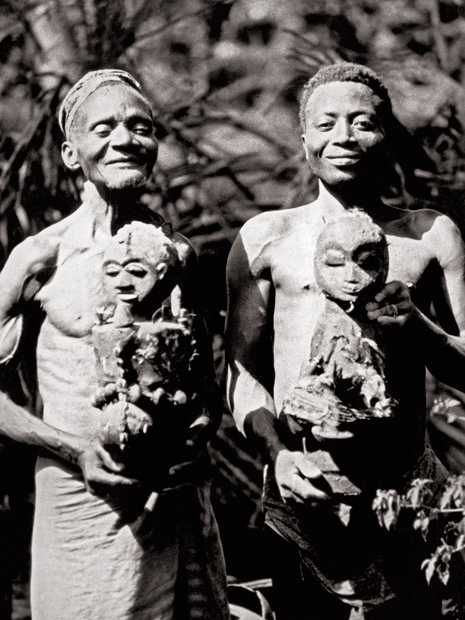Vodun
Vodun is a traditional religious practice of southern BENIN. Also known as Orisha to the YORUBA people of the region, Vodun was brought to the Americas by slaves. There, especially in Haiti, it developed into a form called voodoo.
People who practice Vodun believe that their ancestors entered into agreements with several deities called the Vodun, which represent forces of nature. The ancestors promised the Vodun that people would offer them food and service and would obey certain taboos. Followers claim that misfortunes—such as natural disasters, illness, or the death of a child—occur when someone breaks the contract that the ancestors made with a particular Vodun. When trouble arises, a diviner identifies the exact cause of the problem. Then the offending person may soothe the angry Vodun by giving offerings and performing ceremonies.

Cults and Rituals
Among the many people who practice Vodun, only a few are members of cults dedicated to its deities. Male priests lead these cults, often inheriting their positions from their fathers. The cults' many female members are expected to obey the priests without question. However, women play a prominent role in public ceremonies, where some called vodunsi—said to be the Vodun's “slaves” or “wives”— perform dances and rituals. Sometimes these women enter a trance, in which a Vodun is believed to inhabit their bodies. The practice of such Vodun rituals is usually considered more important than the underlying beliefs.
Perhaps the most important role of Vodun is as a social and political force. Through rituals such as divination and INITIATION RITES that last for several years, Vodun priests exercise great authority over their followers and others in the community. In many cases they compete with other social and political institutions for local control. From 1975 through the 1980s, the government of Benin banned Vodun, believing that its powerful influence might lead people to oppose the revolutionary policies the government wanted to promote. When a new government was established in 1991, authorities encouraged a massive revival of Vodun, hoping to gain favor with the rural population.
Vodun Today
In the cities Vodun has lost some of its power to explain misfortune. The idea of age-old contracts between village elders and gods of nature seems unconvincing in an urban setting where events appear to depend largely upon human actions. City dwellers frequently blame their troubles not on the Vodun but on WITCHCRAFT, actions by human witches or sorcerers that can be fought through magic. Diviners who once claimed that troubles were caused by the Vodun now explain them as the result of witchcraft or a combination of Vodun and witchcraft.
Not everyone in Benin practices Vodun. Nonetheless, most people believe that the Vodun deities exist and many people who are not members of a Vodun cult turn to the practice in times of stress. Only Benin's Islamic groups and a few Protestant Christian groups, including the Methodists and the Jehovah's Witnesses, do not share the belief in a universe of Vodun. Both followers and opponents have criticized Vodun for allowing occasional corruption or excessive control by priests and for charging extremely high fees to perform initiation rites. Many people also feel threatened by the secrecy that surrounds Vodun practices. (See also Religion and Ritual, Spirit Possession.)